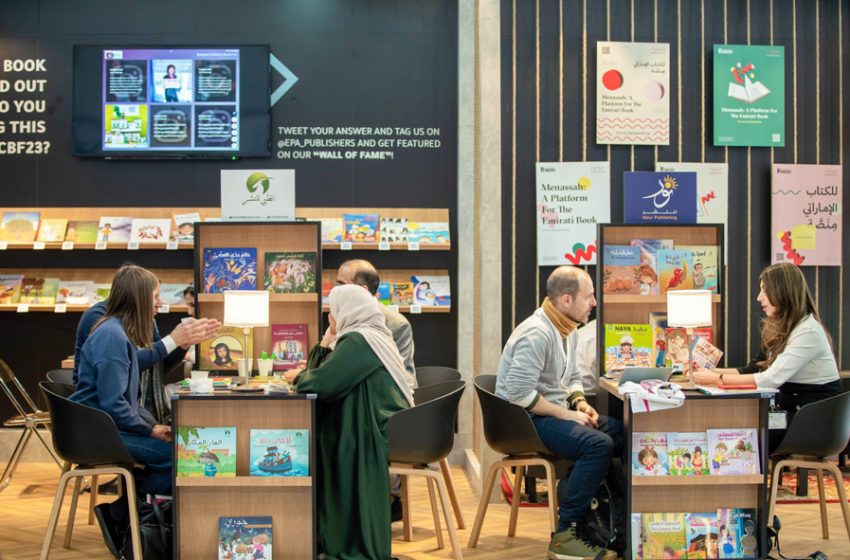Promising visions for the sustainability of the publishing sector.

Since the invention of printing in the mid-fifteenth century AD, the publishing industry has played a vital role as the primary conduit for cultural dissemination. It is responsible for transmitting human thoughts and creative works through various mediums. Publishers serve as the backbone of this industry, shouldering the financial burden of intellectual production while also overseeing and coordinating relationships among the involved parties, such as authors, printers, and distributors. To ensure the industry’s longevity in the present day, it must adapt to the pressing demands of our time, which encompass rapid technological advancements and the imperative of achieving environmental sustainability for our planet.
Despite the significant impact of the COVID-19 pandemic on the global market, the publishing industry has exhibited remarkable resilience. The industry is expected to continue its growth trajectory, with the global publishing market estimated to have reached approximately $288 billion in 2020. A report by the research company Report Linker, published in late 2022, projects that the market will further expand to around $316.8 billion by 2027.
Overcoming Difficulties
The publishing industry in the United Arab Emirates has made significant strides in development over the past decade, despite being relatively modern compared to other countries. Thanks to various supportive factors, the future holds promising opportunities for local publishing houses. Notably, the government’s keen interest in this sector and the state-of-the-art technological infrastructure have positioned the industry for success in keeping up with the demands of the digital age. Furthermore, the relentless efforts of key stakeholders, including the Emirates Publishers Association, have addressed numerous concerns and challenges through pioneering initiatives to organise and promote sustainability and prosperity within the sector.
Due to its advanced technological infrastructure, the UAE publishing sector has demonstrated remarkable resilience during the Covid-19 pandemic. This infrastructure has facilitated the adoption of electronic publishing methods, bolstered by supportive initiatives such as the “Crisis Fund for Publishers” launched by Sheikha Bodour bint Sultan Al Qasimi, Sharjah Book Authority Chairperson, and founder of the Emirates Publishers Association. These proactive initiatives have played a pivotal role in ensuring the continuity of publishing businesses and effectively addressing the challenges imposed by the pandemic on publishers.
The Power of Technology
The Emirates Publishers Association (EPA) is committed to advancing the publishing industry in the UAE through a comprehensive range of services, insights, training, and effective communication. Moreover, the EPA recognises the importance of considering the sector’s environmental impact. In line with technological advancements and the rise of artificial intelligence techniques, the association acknowledges that the publishing industry must harness these technologies at the publishing and distribution levels to ensure sustainability.
Emphasising the need for adaptation, the EPA encourages publishers to balance digital and printed books, considering the increasing presence of digital and audiobook platforms. Additionally, the association promotes adopting electronic marketing strategies and has taken the initiative to launch the “Distribution Platform” project. This project aims to support Emirati publishers in effectively marketing their publications at both local and international book fairs, facilitating their presence and visibility in the global publishing landscape.
The association recognises the immense potential of artificial intelligence (AI) techniques in the publishing industry in the UAE. These techniques provide access to vast amounts of data supporting the entire publishing process. They create opportunities to connect publishing houses with distributors, libraries, and writers while enabling the study of readers’ behaviour and needs. AI also expands the scope for competition at both regional and global levels.
While concerns exist regarding the potential negative impact of AI on content and its originality, the association asserts that there is no need for alarm. It firmly believes that the human element should remain central to literature, thought, and creativity.
Sustainable Practices
The issue of intellectual piracy can be effectively tackled through international collaboration among regulatory institutions. By working together, these institutions can reinforce the legal framework and ensure adequate protection for intellectual property rights and copyrights worldwide. The Emirates Publishers Association shares this goal, as it strives to improve professional conditions and advocate for robust laws about intellectual property in the Emirates and the wider region.
The adoption of modern technologies and artificial intelligence in the publishing sector is not only crucial for its sustainability and adaptability but also contributes to the goals of environmental preservation and combating climate change. Recognising this, the Emirates Publishers Association plays a vital role in promoting awareness among local publishers about sustainable practices in the industry. These practices encompass various initiatives, such as utilising sustainable materials for printing, prioritising digital publishing, implementing print-on-demand mechanisms, and adopting sustainable office practices.
Recognising the noble message that every publisher carries for their community and beyond, it becomes essential for local publishers to unite and embrace sustainable work methodologies across the entire value chain of the publishing industry. These methodologies should be flexible, effective, and able to adapt to the fast-paced nature of the times and the evolving needs of readers.








